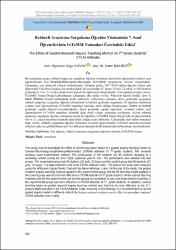Rehberli araştırma sorgulama öğretim yönteminin 7. Sınıf öğrencilerinin fetemm tutumları üzerindeki etkisi
Künye
Sağdıç, M. & Bakırcı, H. (2020). Rehberli Araştırma Sorgulama Öğretim Yönteminin 7. Sınıf Öğrencilerinin FeTeMM Tutumları Üzerindeki Etkisi . Afyon Kocatepe Üniversitesi Sosyal Bilimler Dergisi , 22 (2) , 363-376 . DOI: 10.32709/akusosbil.534626Özet
Bu çalışmanın amacı, rehberli araştırma sorgulama öğretim yöntemine dayalı fen öğretiminin yedinci sınıf
öğrencilerinin Fen-Teknoloji-Mühendislik-Matematik (FeTeMM) tutumlarına etkisini araştırmaktır.
Çalışmada, yarı deneysel yöntem kullanılmıştır. Çalışma grubu, 2017-2018 eğitim-öğretim yılının güz
döneminde Van ilinin Başkale ilçe merkezindeki bir ortaokulda 45'i deney (23 kız, 22 erkek) ve 40'ı kontrol
grubunda (17 kız, 23 erkek) olmak üzere toplam 85 öğrenciden oluşmaktadır. Veri toplama araçları olarak;
FeTeMM Tutum Ölçeği kullanılmıştır. Çalışmada elde edilen veriler, Wilcoxon İşaretli Sıralar Testi ve
Mann Whitney U-testi kullanılarak analiz edilmiştir. Çalışmanın sonunda, deney grubunda uygulanan
rehberli araştırma sorgulama öğretim yönteminin ve kontrol grubunda uygulanan 5E öğrenme modelinin
yedinci sınıf öğrencilerinin FeTeMM tutumları üzerinde etkili olduğu bulunmuştur. Deney ve kontrol
grubunda yapılan öğretim kıyaslandığında; deney grubunda yapılan öğretimin, ortaokul yedinci sınıf
öğrencilerinin FeTeMM tutumları üzerinde daha etkili olduğu sonucuna varılmıştır. Ayrıca rehberli
araştırma sorgulama öğretim yöntemine dayalı fen öğretimi, FeTeMM Tutum Ölçeği’nde yer alan özellikle
fen ve 21. yüzyıl becerileri üzerinde daha etkili olduğu tespit edilmiştir. Çalışmadan elde edilen sonuçlara
bağlı olarak, rehberli sorgulama öğretim modelinin ortaokul öğrencilerinin FeTeMM tutumları üzerinde
etkisinin daha net görülebilmesi için Fen Bilimleri dersinin farklı ünitelerinde kullanılması önerilmektedir. This study aims to investigate the effect of science education based on a guided inquiry teaching model on
Science-Technology-Engineering-Mathematics (STEM) attitudes of 7th
-grade students. The research
employs quasi-experimental method. The participants of the research are 85 students studying in a
secondary school during the 2017-2018 academic year in Van. The participants were divided into two
groups. The experiment group had 45 students (23 girls, 22 boys) and the control group had 40 students (17
girls, 23 boys). The data collection tool is the STEM Attitude Scale. The data in the study were analyzed
using the Wilcoxon Signed Ranks Test and the Mann Whitney U-test. At the end of the study, the guided
research inquiry teaching method applied in the experimental group and the 5E learning model applied in
the control group were found to be effective on STEM attitudes of 7th grade students. When science teaching
methods used for the experimental and control groups are compared, it was concluded that the teaching in
the experimental group was more effective on STEM attitudes of 7th
-grade students. In addition, science
teaching based on guided research inquiry teaching method was found to be more effective on the 21st
-
century skills included in the STEM Attitude Scale. Drawing on the findings, it is recommended to use the
guided inquiry model in different units of the Science course in order to see its effect on secondary students’
STEM attitudes more clearly.
Kaynak
Afyon Kocatepe Üniversitesi Sosyal Bilimler DergisiCilt
22Sayı
2Bağlantı
https://dergipark.org.tr/tr/pub/akusosbil/issue/54924/534626https://hdl.handle.net/11630/9261
Koleksiyonlar
- Cilt 22 : Sayı 2 [20]



















